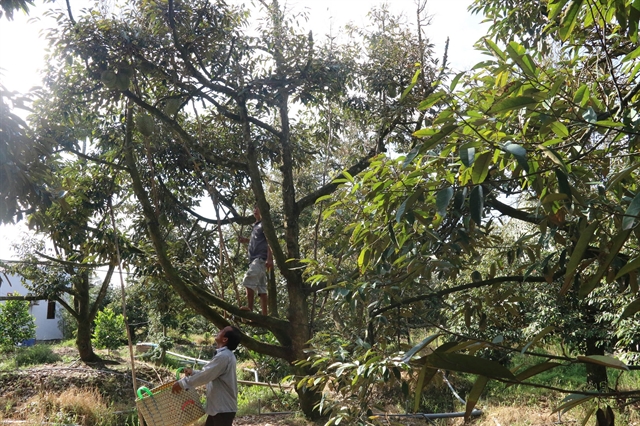 Society
Society


|
| Harvesting durian in Tiền Giang Province’s Cai Lậy District. – VNA/VNS Photo Minh Trí |
TIỀN GIANG – Farmers in Cai Lậy District, the largest durian producer in Tiền Giang Province, have raised their income by improving yield and quality with the use of advanced techniques.
The Cửu Long (Mekong) Delta district has about 9,000ha of durian with an annual output of more than 250,000 tonnes for domestic consumption and export, according to the province’s Department of Agriculture and Rural Development.
More farmers in the district have planted durian under good agricultural practices (GAP) and have used automated irrigation and bio-products, as well as techniques to produce off-season durian.
Farmers have also been using quality durian seedlings. Durian trees normally begin to bear fruit after five years and increase their yield year by year.
The high-quality durian varieties Mong Thong and Ri 6 are the most commonly planted varieties in the district.
Nguyễn Văn Của, who has a 3,500 sq.m Mong Thong durian orchard in Tam Bình Commune, invested VNĐ30 million (US$1,300) in an automatic spraying irrigation system that takes about 15 minutes to water plants.
Previously, it took him nearly one day to irrigate durian trees manually.
The use of advanced techniques has reduced production costs and increased yield, improving the lives of farmers, according to the department’s Agriculture Extension and Services Centre.
The use of an automatic system, for instance, saves 50 per cent of irrigation water compared to manual irrigation and saves 90 per cent of labour costs for irrigation. It has helped raise farmers' incomes by 5 – 10 per cent and solved the labourer shortage for crop irrigation in rural areas.
Farmers in the district have also been producing off-season durian with advanced techniques. Durian trees have one harvest a year in lunar May and June. With the techniques of producing off-season durian, farmers can have harvest in lunar September and October.
The price of off-season durian is three to four times higher than durian from the main harvest, according to farmers.
Local authorities have encouraged durian farmers to use VietGAP and GlobalGAP standards to ensure food safety, environmental protection and origin traceability.
Nguyễn Văn Lâm, chairman of the Tam Bình Commune People’s Committee, said the commune has 1,400ha of durian and is the district’s largest durian cultivation area.
The commune has two durian co-operative groups – Bình Hòa B and Bình Hòa A – which instruct farmers to grow durian under VietGAP and GlobalGAP standards.
The Bình Hòa B durian co-operative group has 21.1ha of durian that has been granted GlobalGAP certification.
Nguyễn Văn Nhủ in Tam Bình’s Bình Hòa B Commune has a 5,000-sq.m durian orchard and harvests about 10 tonnes of durian a year at an average price of VNĐ60,000 a kilogramme.
He earns a profit of VNĐ400 million ($17,300) after deducting all production costs for his 10-year-old durian orchard.
“I switched from growing rice to planting durian after seeing an opportunity to improve the life of my family,” he said.
The communes of Tam Bình, Long Trung, Long Tiên, Ngũ Hiệp, Hội Xuân and Cẩm Sơn in the district that specialise in growing durian have established agriculture service co-operatives to encourage farmers to work together and apply GAP standards.
The Ngũ Hiệp Durian Co-operative in Ngũ Hiệp Commune has 15ha of durian planted under VietGAP standards and has built a 200 sq.m workshop for packing durian fruit.
The co-operative has also developed a value chain for durian production, and supplies about 400 tonnes of VietGAP-quality durian to the market a year.
To develop sustainable cultivation, district authorities plan to develop value chains for 3,000ha of durian in the district’s major durian growing communes.
Last year, the National Office of Intellectual Property granted a collective brand name “Sầu riêng Cai Lậy” for the district’s durian fruit.
Tiền Giang Province is the country’s largest fruit producer, with many speciality fruits like durian, mango, milk apple and longan.– VNS




